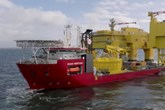Root Energy completes Korea’s first OWF resident participation programme
Published by Jessica Casey,
Editor
Energy Global,
Root Energy Inc., Korea’s leading renewable energy local acceptance solution provider as well as a certified B Corp, has raised KRW 20 billion (approximately US$15 million) crowdfunded by residents of Suwon-ri, Hallim-eup, Jeju Island. It makes it Korea’s largest offshore wind farm. Jeju Hallim Offshore Wind meet qualification for resident participation certified by the Korean government for the first time in the country.
Hallim offshore wind is Korea's largest offshore wind power generation project, with 18 generators of 5.56 MW producing a total of 100 MW of electricity. This project with a total cost of KRW 630 billion (approximately 470 million) began construction in January 2022 and aims to complete within October 2024.
Root Energy is the first to carry out a community-based crowdfunding model with more than 667 residents, and to raise the largest community investment of over KRW 20 billion (KRW 30 million per capita in average) in Korea. This case sets a significant precedent both domestically and globally, as laying the foundation for residents to take the lead in sharing of profits generated by nearby power plants.
Among different methods of renewable energy resident participation, the company decided to choose the community-based type which was evaluated to allow residents to actively express their opinions. As Suwon-ri is the village closest to the Hallim offshore wind farm and is the area whose landscape and lifestyle are most affected by power plant construction, it is importantly considered that residents should independently decide how to share benefits.
By taking part, Suwon-ri residents will receive part of profits generated through electricity sales upon the completion of the offshore wind farm. Also, they will be able to take initiative in profit sharing plans to advance local businesses such as distribution of local agricultural and marine products and establishing horizontal village hotels. Horizontal village hotels are an idea of urban regeneration of old or decaying towns, which lets visitors immerse themselves in the charm of the local area instead of staying in a high hotel.
“As Korea pledged to triple renewable energy at COP28, for it to become more widely distributed, it has no choice but to gradually become closer to residents’ living and working areas. Without residents both understanding the need for renewable energy and actively engaging with it, the expansion of renewable energy will reach the limit at some point,” said Yoon Tae-hwan, CEO of Root Energy.
“This Hallim Offshore Wind Power resident participation case shows the possibility of renewable energy development where residents take lead, going beyond the resident participation. As a company specializing in community acceptance, Root Energy will continue to make efforts to foster local co-existence through resident leading renewable energy profit sharing projects,” added Yoon.
For more news and technical articles from the global renewable industry, read the latest issue of Energy Global magazine.
Energy Global's Winter 2023 issue
The Winter 2023 issue of Energy Global hosts an array of technical articles weather analysis, geothermal solutions, energy storage technology, and more. This issue also features a regional report looking at the future of renewables in North America, and a report from Théodore Reed-Martin, Editorial Assistant, Energy Global, on how Iceland utilises its unique geology for renewable energy.
Read the article online at: https://www.energyglobal.com/wind/23022024/root-energy-completes-koreas-first-owf-resident-participation-programme/
You might also like
Jan De Nul concludes 2025 installation campaign at TenneT's DolWin kappa substation
Jan De Nul has concluded the 2025 transport and installation campaign of three HVAC grid connection cables at TenneT’s DolWin kappa platform.

